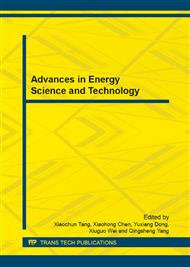p.778
p.782
p.786
p.791
p.795
p.799
p.804
p.811
p.817
Theoretical Investigations of the Mechanism of CO2-CH4 Reforming Reaction Catalyzed by Transition Metals (Pt, Rh, Ru) under a Supercritical Condition
Abstract:
A mechanism of CO2-CH4 reforming over supported transition metal catalysts (platinum, rhodium, ruthenium) under a supercritical condition (304.13K, 72.90atm) was investigated using the B3LYP density functional method and MP2 method. Results obtained show that there are two channels in this reaction. The oxidized material is the most important catalyst in each reaction channel. For Pt, Rh and Ru, the rate-determining step of the reaction is the same - the step of CO2 activation. Because of the large activation energies, the oxide reforming on Rh and Ru catalysts can't proceed under the supercritical condition. For Pt, the CO2 activation reaction proceeds easier than the other two kinds of catalysts. According to the energy calculation results, specific activities of three kinds of the transition metals follow in the order: Pt > Rh > Ru.
Info:
Periodical:
Pages:
795-798
Citation:
Online since:
February 2013
Authors:
Price:
Сopyright:
© 2013 Trans Tech Publications Ltd. All Rights Reserved
Share:
Citation:


